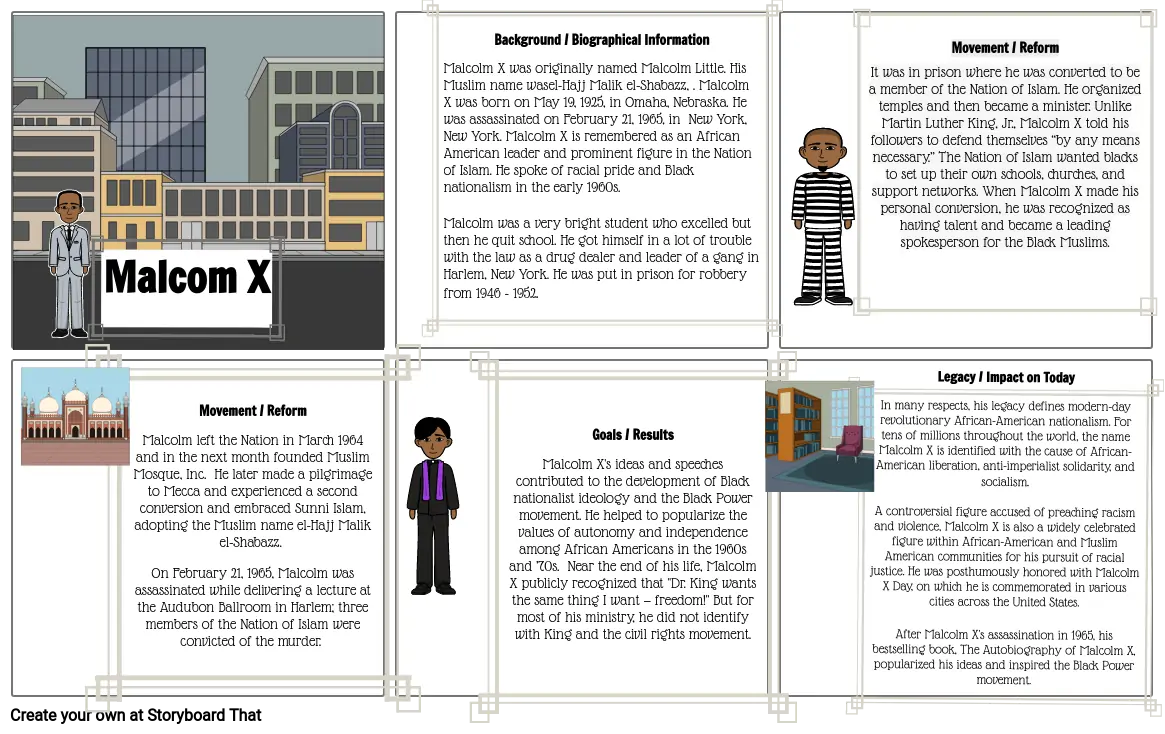American History Project

Storyboard Text
- Movement / ReformMalcolm left the Nation in March 1964 and in the next month founded Muslim Mosque, Inc. He later made a pilgrimage to Mecca and experienced a second conversion and embraced Sunni Islam, adopting the Muslim name el-Hajj Malik el-Shabazz. On February 21, 1965, Malcolm was assassinated while delivering a lecture at the Audubon Ballroom in Harlem; three members of the Nation of Islam were convicted of the murder.
- Malcom X
- Background / Biographical InformationMalcolm X was originally named Malcolm Little. His Muslim name wasel-Hajj Malik el-Shabazz, . Malcolm X was born on May 19, 1925, in Omaha, Nebraska. He was assassinated on February 21, 1965, in New York, New York. Malcolm X is remembered as an African American leader and prominent figure in the Nation of Islam. He spoke of racial pride and Black nationalism in the early 1960s. Malcolm was a very bright student who excelled but then he quit school. He got himself in a lot of trouble with the law as a drug dealer and leader of a gang in Harlem, New York. He was put in prison for robbery from 1946 - 1952.
- Movement / ReformIt was in prison where he was converted to be a member of the Nation of Islam. He organized temples and then became a minister. Unlike Martin Luther King, Jr., Malcolm X told his followers to defend themselves “by any means necessary.” The Nation of Islam wanted blacks to set up their own schools, churches, and support networks. When Malcolm X made his personal conversion, he was recognized as having talent and became a leading spokesperson for the Black Muslims.
- Goals / ResultsMalcolm X's ideas and speeches contributed to the development of Black nationalist ideology and the Black Power movement. He helped to popularize the values of autonomy and independence among African Americans in the 1960s and ’70s. Near the end of his life, Malcolm X publicly recognized that "Dr. King wants the same thing I want — freedom!" But for most of his ministry, he did not identify with King and the civil rights movement.
- Legacy / Impact on TodayIn many respects, his legacy defines modern-day revolutionary African-American nationalism. For tens of millions throughout the world, the name Malcolm X is identified with the cause of African-American liberation, anti-imperialist solidarity, and socialism.A controversial figure accused of preaching racism and violence, Malcolm X is also a widely celebrated figure within African-American and Muslim American communities for his pursuit of racial justice. He was posthumously honored with Malcolm X Day, on which he is commemorated in various cities across the United States.After Malcolm X's assassination in 1965, his bestselling book, The Autobiography of Malcolm X, popularized his ideas and inspired the Black Power movement.
Over 30 Million Storyboards Created

